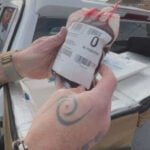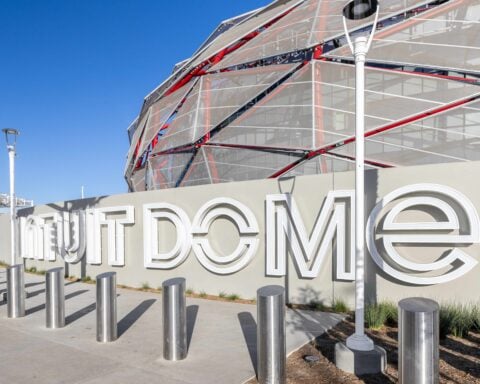A substantial majority of likely California voters favor Proposition 36, a November ballot measure that would impose tougher penalties for retail theft and fentanyl-related crimes, according to a new poll from the University of California, Berkeley Institute of Governmental Studies.
The poll, co-sponsored by the Los Angeles Times, found that 60% of likely voters support Proposition 36, the Homelessness, Drug Addiction and Theft Reduction Act, while 21% oppose it and 19% remain undecided.
According to Mark DiCamillo, director of the Berkeley IGS Poll, support for the measure has increased since August, driven primarily by voters' desire to impose harsher punishments on repeat offenders.
"Voters are intent on passing this initiative," DiCamillo said. "The reasons, I think, are interesting."
The measure would overhaul parts of Proposition 47, a 2014 law that reduced penalties for certain drug and property crimes. Under current law, thefts involving merchandise valued at $950 or more are considered felonies, up from the previous threshold of $450.
The initiative has garnered strong backing from California prosecutors and major retailers, including Walmart. However, it faces opposition from Governor Gavin Newsom and Democratic legislative leadership, who warn it could return the state to past tough-on-crime policies that led to prison overcrowding and constitutional violations.
The poll revealed broad support across demographic groups, with majorities of Republicans and independents strongly favoring the measure and a plurality of Democrats. Support spans gender and age groups, though voters under 30 showed the least enthusiasm.
Black voters stood as the only racial or ethnic group opposing the measure, which critics say will disproportionately affect people of color. Majorities of white, Latino, and Asian American/Pacific Islander voters expressed support.
The legislative analyst's office projects the initiative could cost California hundreds of millions of dollars annually. Newsom has criticized these potential costs, calling the measure an "unfunded mandate." He has also questioned its drug treatment provisions, noting that 22 of the state's 58 counties lack residential treatment facilities.
Greg Totten, co-chair of the Yes on Proposition 36 campaign, said the poll results align with what his campaign hears from residents statewide. "Voters want a balanced approach to improving safety in their neighborhoods that holds repeat theft offenders and fentanyl traffickers accountable and highly incentivizes drug treatment for people with addictions," he said.
The opposition campaign countered through spokesperson Anthony York that supporters have "done an effective job of misleading voters." York argued that the measure would reduce treatment funding while increasing prison spending.
Nearly half of those surveyed believe rehabilitation and treatment for first-time offenders represent the best approach to improving California's criminal justice system. Voters appear split on whether Proposition 36 would effectively address homelessness or drug addiction, with 42% doubting its effectiveness and 39% believing it would help.
Among opponents, 86% prioritize expanding rehabilitation and treatment options over increased enforcement. By contrast, only 31% of the measure's supporters share this view.
The Berkeley poll also tracked voter sentiment on other November ballot initiatives. Support for Proposition 32, raising the state's minimum wage, has declined from 52% in August to 46% in late September. The measure shows the strongest support in urban areas, with 56% of likely voters in the San Francisco Bay Area and 50% in Los Angeles County favoring it.
Similarly, backing for Proposition 33, which would expand local government authority to enact rent control, has weakened. Support dropped from 40% in August to 37% in the latest poll.
The nonpartisan survey was conducted online in English and Spanish from Sept. 5 to Oct. 1, polling 3,045 likely voters in the upcoming November election.
Earlier this summer, Newsom and Democratic leaders attempted to create an alternative ballot measure addressing crimes like shoplifting through less punitive means than Proposition 36. However, the governor withdrew this effort in early July.
Law enforcement organizations have criticized the 2014 reforms under Proposition 47, arguing that reduced penalties have contributed to increased theft and other criminal activity across California. The current measure aims to address these concerns while balancing calls for rehabilitation and treatment options.
The poll suggests voters may prioritize immediate action on crime over warnings about potential negative consequences, despite opposition from state leadership. As DiCamillo noted, "There are things voters have on their minds that apparently the politicians have underestimated."

 Another 75 Guatemalan soldiers arrive in Haiti to battle gangs
Another 75 Guatemalan soldiers arrive in Haiti to battle gangs
 Ohio Lt. Gov. Jon Husted emerges as leading contender for JD Vance’s Senate seat
Ohio Lt. Gov. Jon Husted emerges as leading contender for JD Vance’s Senate seat
 Amit Yoran, cybersecurity executive and entrepreneur, has died at 54
Amit Yoran, cybersecurity executive and entrepreneur, has died at 54
 See Jimmy Carter's boyhood home as his funeral motorcade travels to Atlanta
See Jimmy Carter's boyhood home as his funeral motorcade travels to Atlanta
 Italian PM Meloni flying to US to meet Trump, Italian media report
Italian PM Meloni flying to US to meet Trump, Italian media report
 Health centers in Colorado to use war medical tactic to help save lives
Health centers in Colorado to use war medical tactic to help save lives
 Austrian Chancellor Nehammer says he will resign after talks on forming a new government fail
Austrian Chancellor Nehammer says he will resign after talks on forming a new government fail
 Biden awards Presidential Medal of Freedom to Hillary Clinton, Michael J. Fox, Denzel Washington
Biden awards Presidential Medal of Freedom to Hillary Clinton, Michael J. Fox, Denzel Washington
 Jimmy Carter’s son says goodbye to dad
Jimmy Carter’s son says goodbye to dad
 No. 1 Tennessee beats No. 23 Arkansas 76-52 to match best start in program history
No. 1 Tennessee beats No. 23 Arkansas 76-52 to match best start in program history
 New Berkeley poll shows 60% of California voters support Proposition 36, which would toughen penalties for retail theft and fentanyl crimes.
New Berkeley poll shows 60% of California voters support Proposition 36, which would toughen penalties for retail theft and fentanyl crimes.






